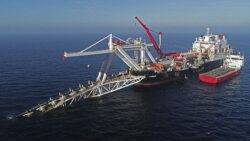Together, the 27 EU member states manage the largest maritime exclusion zone in the world.
The European Commission wants EU-wide naval exercises, involving military and civilian entities, to be intensified as soon as possible, in large part due to the increased threats to critical infrastructure in the maritime domain.
In November last year, the Nord Stream gas pipeline was hit by an explosion and in March, several European governments detected suspicious acts of espionage by Russian vessels in the North Sea.
At the opening of the European Maritime Day in Brest, France, the European Commissioner for Oceans, Virginijus Sinkevi?ius, said in an interview that a new action plan is being prepared, under the EU Strategy for the Safeguard of the Maritime Domain.
“The risks are very realistic because we have seen what has happened with the Nord Stream infrastructure and still the investigation is ongoing, with more and more details,” he told Euronews.
“So, I think we have to be realistic about the current geopolitical situation at which we are now and we have to take all possible measures.
“And for this reason, in our updated EU maritime strategy we have included a very important part of protecting and monitoring our key infrastructures especially knowing that it plays a key role in our energy independence and strategic autonomy.”
Offshore wind farms, submarine communication cables and pipelines are also among the infrastructure deemed critical.
The European Maritime Safety Agency, based in Lisbon, is also preparing to coordinate and assist member states to increase their alertness.
A modernised digital platform will be launched in January 2024 under the name of Common Information Sharing Environment (CISE).
“We can use CISA as a platform to inform each other, also to use it for early warning and for alerts,” Leendert Bal, Head of Department the for Safety, Security and Surveillance at the European Maritime Safety Agency told Euronews.
“So, it will make a unique combination connection between all the authorities in Europeans working in maritime surveillance.”





